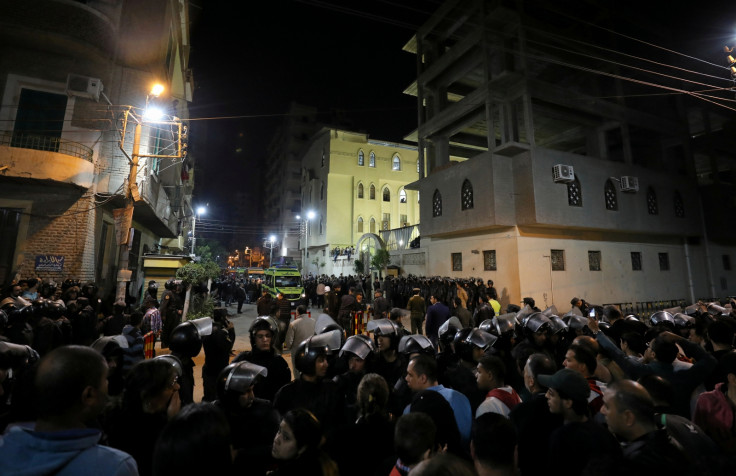7 suspected Isis militants killed as Egypt mourns victims of Palm Sunday church bombings
The militants were reportedly planning further attacks on the Coptic Christian community.
At least seven suspected Isis militants have been killed in a shoot-out on Monday (10 April) in the southern Egyptian city of Assiut, the country's interior ministry said.
The shoot-out took place two days after twin bombings targeting the Coptic Christian minority ripped through churches in Alexandria and the Nile Delta city of Tanta killing over 40 people. The attacks led to the declaration of a three-month state of emergency in Egypt.
The militants shot dead on Monday were reportedly planning further attacks on the minority community. Ammunition, weapons, a motorcycle, Islamic State books and publications were also seized from the place of the incident, an interior ministry statement said.
Victims mourned
Hours before the shooting incident, family members of victims who died in the twin blasts on Palm Sunday gathered for a mass funeral at the Monastery of Saint Mina in Alexandria. Under heavy security, hundreds of mourners carried coffins to the beat of drums as priests in black robes chanted prayers.
"Where should we go pray? They are attacking us in our churches. They don't want us to pray but we will pray," Samira Adly, 53, one of the mourners said.
"Everyone is falling short... the government, the people... nothing is good," Adly added, expressing anger at what she said was the state's failure to keep them safe on one of their holiest days.
Young people who gathered outside the monastery during the memorial service also showed their rage by shouting, "Down with any president as long as Egyptian blood is cheap" and "Down with military rule".
Isis has claimed responsibility for the double bombings on the Mar Girgis church in Tanta city, north of Cairo and at St Mark's Church in Alexandria that took place on 9 April.
Palm Sunday is observed a week before Easter Sunday and is one of the holiest days in the Christian calendar as it marks Jesus' entry into Jerusalem before his crucifixion.
A family member of one of the people killed in the attack in Tanta, where the suicide bomber managed to get inside the church, also expressed anger at the failure of the state to keep the worshippers safe.
"How did the bomb enter when there's security outside the church? They're saying now the metal detector wasn't working," Beshoy Asham said.
Pope's visit
Meanwhile, the attacks, which marked one of the bloodiest days in recent memory for Egypt's Coptic Christian minority, have also raised security concerns ahead of a visit to Cairo by Pope Francis, the head of the Roman Catholic Church.

But the Vatican's deputy secretary of state, Archbishop Angelo Becciu, said on Monday that the trip would go on as scheduled on 28 and 29 April.
"What happened caused disorder and tremendous suffering, but it cannot stop the Pope's mission of peace," he said.
Egypt's Coptic Christians have been the target of attacks since the ouster of the former president Mohamed Morsi in 2013. Militants and Islamists believe the Copts supported the military in overthrowing the Islamist president. In December 2016, 29 worshippers at a Cairo church were killed by the Isis and in 2011, a Coptic church in the coastal city of Alexandria was attacked on New Year's Day, killing over 20 people.
© Copyright IBTimes 2025. All rights reserved.




















